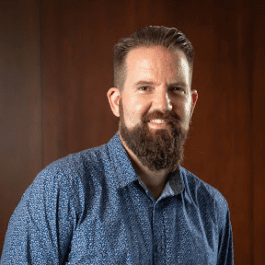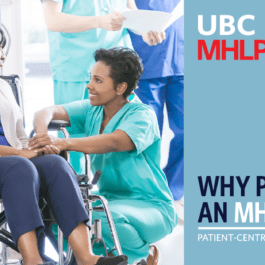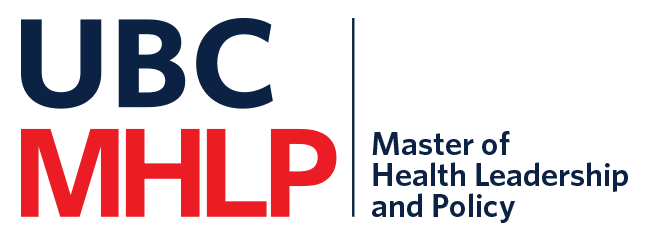
Seniors Care — Justin Krzanowski
Alumnus Story - Justin Krzanowski

Justin Krzanowski is integrating the leadership and health-care knowledge he acquired over the course of his MHLP in Seniors Care to lead a team tasked with developing and implementing discharge policies and procedures from the acute care setting.
Justin Krzanowski built a career providing exceptional patient-centred care, both directly and through his leadership positions. With over 15 years at Vancouver Coastal Health, he started as a bedside nurse and then moved into positions providing home health care and seniors care, eventually being promoted to a clinical operations supervisor position for geriatric programs at UBC Hospital.
Justin began researching master’s programs to gain the credentials and knowledge that would enable him to move into more senior management positions. While he considered options like UBC’s Master of Health Administration and Master of Science in Nursing, he found himself drawn to the UBC Master of Health Leadership and Policy (MHLP).
“I enjoyed the MHLP program because it offered a hybrid of both business and clinical perspectives,” he says.
“The hybrid focus means that there’s an economic business lens applied to the health care courses and you are encouraged to integrate your clinical knowledge in the business courses. I saw this as important for managing and leading teams within the health care system and for learning more about how different business models and approaches could be applied to health care.”
Another selling point for Justin was the MHLP’s specialization in Seniors Care, which would enable him to deepen his knowledge of best practices in gerontology, an area of focus for him over the prior 10 years of his career.
An interdisciplinary education in health care management
Students in the MHLP in Seniors Care take specialized courses taught through the UBC School of Nursing on philosophies of care, organizational considerations for fostering health, evidence-based practices, social and environmental elements of seniors care, and health policy.
Justin completed a research project in one of his courses on the use of anti-psychotic medications to treat adults experiencing behavioural and psychological symptoms in dementia. “I examined the policies behind the use of anti-psychotropic medications for older adults in care and the use of these as chemical restraints,” he says.
“In fact, there is very little published information and few established policies to guide geriatric psychiatrists and nurses on dosage, such as when it is appropriate to use these medications and when you might need to titrate and stop. This project opened my eyes as a clinical leader in terms of what policies might be missing in the acute care system to ensure safe patient care.”
The MHLP in Seniors Care also includes business and leadership courses taught through UBC Sauder’s Robert H. Lee Graduate School.
“One initial challenge for me was becoming more comfortable with the focus on accounting and finance within a large organization,” says Justin. “When you are working in frontline positions, it’s not as important, but as you move into senior leadership positions, it becomes essential to be fluent in the language of numbers and accounting.”
“Some of this is just developing very practical skills and learning, for example, how to use Excel spreadsheets so you can use data analysis as one more way to communicate with others and share information,” Justin elaborates.
He adds that leadership courses helped him develop a framework of understanding about being a leader so that he can be more intentional about creating cohesive teams characterized by open communication where everyone understands the “why” behind certain decisions and policies.
“Doing the MHLP and learning from other professionals in leadership roles helped me develop and strengthen my own skills in this area,” he says. “You get a great deal of feedback from your peers as you work together on team projects. And the course content brought a new focus to overall workflows and big picture thinking.”
“The nitty-gritty details are essential, but someone must know where the ship is going, know the risks and benefits, and be able to communicate that. Through the MHLP coursework and projects, you get great practice in how to develop pathways in leading a group to reach a goal.”
Becoming a clinical practice lead
Justin chose the two-year part-time MHLP option so that he could go to school while continuing to work and meet the demands of his young family. Partway through the first year of the program he was promoted into a management position at UBC Hospital, managing a short-stay assessment, treatment in-unit and a gerontological ambulatory medical day program.
After he finished his program in December 2023, Justin decided to find a position closer to his home in Langley to shrink his commute from close to two hours to 20 minutes.
He is currently working as a clinical practice lead for the acute community health nursing team at the Royal Columbian Hospital. He’s leading a team, overseeing discharge policies and the process for community health nursing’s role in safe discharges from acute care to community care.
“There is a lot of pressure in the acute health-care system regarding patient flow,” he says. “You need to think quickly and be able to collaborate and problem solve. In this role, I’m working with directors and management on patient flow, and my background in seniors care certainly informs my work and perspective on safe discharges.”
“What I like about this job is leading and being part of a team, of being able to take care of a group of people within a work environment as we set objectives and try to meet them. I enjoy getting together to celebrate our wins and having debriefings about where we can improve. I also have an educational role where to ensure we continue to meet our accreditation standards – recently I’ve taught sessions on ethical framework decision-making.”
He believes the MHLP was well worth the investment of time and money.
“The MHLP provided a framework for many things I was intrinsically doing and gives me new tools for identifying appropriate change processes or change management tools for specific situations,” he says.
“I also have the language to speak to the senior leadership team, understanding how to communicate ideas with data/evidence. There is a certain respect that comes with this degree, thanks to its combination of leadership, policy and health-care focused knowledge, that demonstrates that you understand health-care operations and know how to organize them.”
Application Deadlines
Get ready to apply!
Admissions for the 2026 intake will open on January 1, 2025.
How to ApplyJoin us for an
Info Session
Sign up for our latest online information sessions and discover what our programs have to offer.
Sign Up NowAssess your Eligibility
Determine if your professional experience and academic background make you a fit for your desired program.
Start AssessmentApplicant Guide
Navigate the application process with ease!
Sign up to receive tailored instructions and a detailed guide directly to your email.
Sign up

